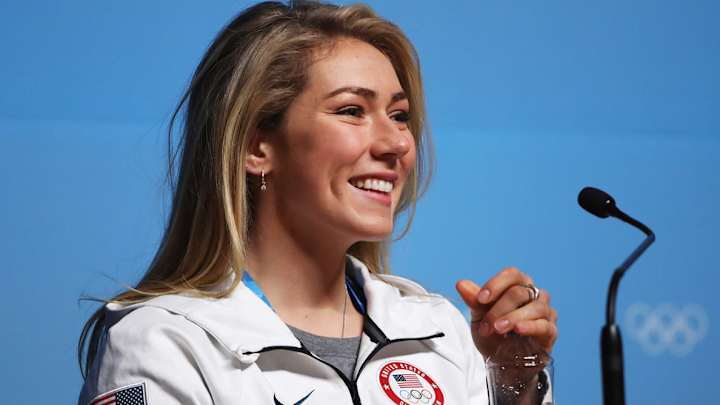Mikaela Shiffrin Is a (Reluctant) Star in the Making Who Can Make Her Mark in PyeongChang

PYEONGCHANG, South Korea—Mikaela Shiffrin made a crack about the enormous table she would sit behind for her press conference, sat down and tried to break the ice.
“Hi guys, how are you?” she said.
There was no way for a roomful of journalists to answer that question.
“Just wanted to say ‘Hey,’” Shiffrin said.
The Olympics produce many medalists but only a few stars. Winning a medal takes talent, dedication and sometimes a little luck. Becoming a star requires qualities that are harder to define. Usain Bolt is a star. Lindsey Vonn is a star—not just in the skiing world, but beyond. One interesting subplot of these Olympics is whether Shiffrin will join them.
Shiffrin held her pre-Olympics press conference here Saturday. It was scheduled for 30 minutes but cut down to 20 before it began. Shiffrin is poised and gives thoughtful answers to reporters’ questions, though she is a bit self-conscious in a public setting. If she were your sister or friend, you might get nervous watching her.
When her moderator mentioned that the media could come watch Shiffrin’s training runs, she cracked, “Or don’t come. Whatever.” She pointed out that “this is the biggest press conference I’ve done all season.” She said keeps her medals tucked away inside socks. (Be careful with your laundry, Mikaela). She said she does have a few mementos hanging in her home, but quickly added that was only because she had “dead space on my wall.” After relaying what she has done since arriving in Korea more than a week ago—mostly sleep, train and eat—she said, “I’m fairly boring. You guys will find that out throughout these games.” It is hard to build an ad campaign around that.
Shiffrin is an undeniable star on the slopes; her accomplishments before the age of 23 are unprecedented. She may win so many medals this week that she joins Bolt and Michael Phelps as an Olympian everybody recognizes. In the meantime, she is caught in this odd cultural place: she has not yet transcended her sport, but she might.
Vonn seems to have done it, and she seems to have wanted to do it. She is skilled at crafting an image without seeming like she is trying too hard to craft an image. She lets us in on her life and says just enough to keep fans wanting more. She kept her married name, Vonn, after her divorce, well-aware that Lindsey Vonn is not just her name. It is an internationally recognized brand. Her maiden name, Lindsey Kildow, is not.
Vonn is the downhill icon, always willing to go a little faster than a knee surgeon might recommend. She dated fellow star Tiger Woods, which (naturally) made her an even bigger star. Vonn brings sizzle wherever she goes.
Shiffrin is the slalom master who is still figuring out how to let loose on the downhill. She is dating fellow skier Mathieu Faivre. Shiffrin, so far, has brought mostly skill than sizzle. This is not a knock. Celebrity is not a reward for good behavior or impeccable character.
Shiffrin has handled her mercurial career so well, it is easy to forget how difficult it is to excel in more than one Olympic cycle. Swimmer Missy Franklin was on a Shiffrin-esque path after the 2012 London Olympics; four years later, she won one medal, in a relay. Vonn, the finest female skier ever, has only won two Olympic medals due to a combination of injuries and unfortunate timing. Shiffrin may win more than that this week.
Asked about any comparison to Phelps, Shiffrin said, “You’re crazy.” It was the polite and humble thing to say. But we are not crazy.
When Phelps first burst onto the Olympic stage in Athens in 2004, he was a well-packaged commodity but rarely said anything interesting. He didn’t have to. All anybody had to say was that Phelps was trying to surpass Mark Spitz’s record of seven gold medals. Every American sports fan knew about Spitz’s record. That was enough for us.
When Phelps won six golds in Athens, the hype for Beijing in 2008 began immediately; when he won eight golds there, he became a transcendent star. His subsequent personal struggles and recovery were compelling, and eventually Phelps became more comfortable and eloquent in public settings. But by that time, we already cared about him. He was embedded in our cultural consciousness.
Mikaela Shiffrin may become one of the biggest stars in American sports, but she will not crash through a fence to get there. She was asked Saturday how many events she will enter here; if she goes for five medals and succeeds, it would be one of the great achievements in Winter Olympic history. A lot of us wanted to hear her say she will enter all five. Shiffrin said she will race in the first two events, the slalom and giant slalom, and then see how she feels.

Michael Rosenberg is a senior writer for Sports Illustrated, covering any and all sports. He writes columns, profiles and investigative stories and has covered almost every major sporting event. He joined SI in 2012 after working at the Detroit Free Press for 13 years, eight of them as a columnist. Rosenberg is the author of "War As They Knew It: Woody Hayes, Bo Schembechler and America in a Time of Unrest." Several of his stories also have been published in collections of the year's best sportswriting. He is married with three children.
Follow rosenberg_mike